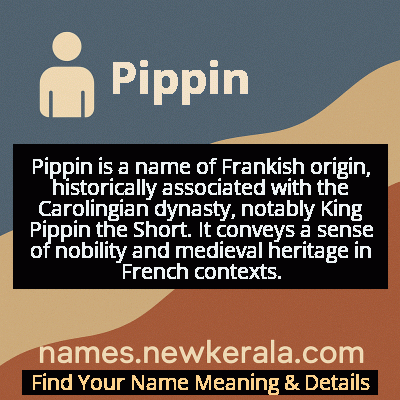Pippin Name Meaning & Details
Origin, Popularity, Numerology Analysis & Name Meaning of Pippin
Discover the origin, meaning, and cultural significance of the name PIPPIN. Delve into its historical roots and explore the lasting impact it has had on communities and traditions.
Name
Pippin
Gender
Male
Origin
French
Lucky Number
8
Meaning of the Name - Pippin
Pippin is a name of Frankish origin, historically associated with the Carolingian dynasty, notably King Pippin the Short. It conveys a sense of nobility and medieval heritage in French contexts.
Pippin - Complete Numerology Analysis
Your Numerology Number
Based on Pythagorean Numerology System
Ruling Planet
Saturn
Positive Nature
Ambitious, efficient, realistic, and authoritative.
Negative Traits
Materialistic, stressed, confrontational, and can be overly ambitious.
Lucky Colours
Dark blue, black.
Lucky Days
Saturday.
Lucky Stones
Blue sapphire, amethyst.
Harmony Numbers
2, 4, 6.
Best Suited Professions
Business leaders, managers, financial services, law enforcement.
What People Like About You
Leadership, determination, organizational skills.
Famous People Named Pippin
Pippin the Short
King of the Franks
Founded Carolingian dynasty and father of Charlemagne
Pippin of Herstal
Mayor of the Palace
Ruled Frankish kingdom and established Pippinid dominance
Pippin I of Aquitaine
King of Aquitaine
Ruled Aquitaine during Carolingian Empire under his father Louis the Pious
Pippin II of Aquitaine
King of Aquitaine
Continued Aquitainian rule and resisted Frankish central authority
Name Variations & International Equivalents
Click on blue names to explore their detailed meanings. Gray names with will be available soon.
Cultural & Historical Significance
Beyond political significance, the name Pippin represents the cultural flowering of the Carolingian Renaissance. Under Pippin's son Charlemagne and subsequent Carolingian rulers, Europe experienced renewed interest in classical learning, educational reform, and artistic achievement. The name thus evokes both hard political power and soft cultural influence. In French national memory, the Pippinid-Carolingian period represents the foundation of French identity, when Frankish, Roman, and Christian traditions fused to create the distinctive culture that would dominate medieval Western Europe.
Extended Personality Analysis
Historical and cultural associations with the name Pippin suggest a personality characterized by strategic intelligence and natural leadership abilities. Individuals with this name are often perceived as having the political acumen and diplomatic skills that made the original Pippinid rulers successful. They tend to be pragmatic yet visionary, capable of making difficult decisions while maintaining broader perspectives. The name carries connotations of reliability and determination—qualities essential for anyone bearing the weight of significant responsibility or legacy.
Modern psychological interpretations of the name suggest Pippins are often adaptable individuals who balance tradition with innovation. They may display a certain gravitas or seriousness of purpose, tempered by practical wisdom. The name's royal associations imply someone comfortable with authority yet aware of its responsibilities. At the same time, the more contemporary pop culture references (particularly Tolkien's hobbit) add layers of curiosity, loyalty, and approachability to the name's personality profile. This creates an interesting tension between the formal, historical gravitas and more informal, friendly modern connotations.
Modern Usage & Popularity
In contemporary naming practices, Pippin occupies a unique niche as a historically significant yet uncommon choice. While it has never reached mainstream popularity, it maintains a steady presence among families with specific interests in French history, medieval studies, or literary traditions. The name saw a modest increase in attention following the Lord of the Rings film series (2001-2003), though this influence was limited. Currently, Pippin is more commonly used in European countries than in North America, with occasional appearances in the United Kingdom and France. Its usage patterns show it appeals particularly to educated, culturally aware parents seeking distinctive names with deep historical roots. The name's rarity makes it an attractive option for those wanting to avoid trends while still choosing a name with substantial cultural heritage and recognizability.
Symbolic & Spiritual Meanings
Symbolically, the name Pippin represents the intersection of personal identity and historical legacy. It embodies the concept of 'noblesse oblige'—the idea that privilege and position carry responsibilities. Like the small apple variety it shares its name with, Pippin symbolizes how something seemingly modest can contain significant potential and sweetness. The name metaphorically suggests growth through challenge, reflecting how the original Pippinid rulers built their power through careful strategy and perseverance.
The name also carries symbolic weight as a bridge between eras and cultures—Frankish origins, French development, and broader European significance. It represents the transformation of raw power into legitimate authority, mirroring the Pippinid transition from palace administrators to crowned monarchs. In a more abstract sense, Pippin symbolizes the enduring nature of legacy and how names carry the weight of history while remaining open to new interpretations and meanings in contemporary contexts.

